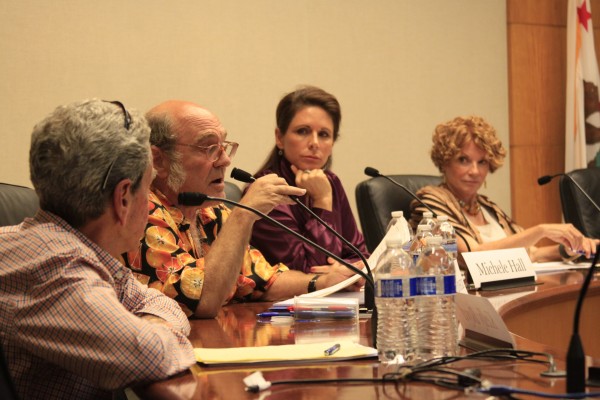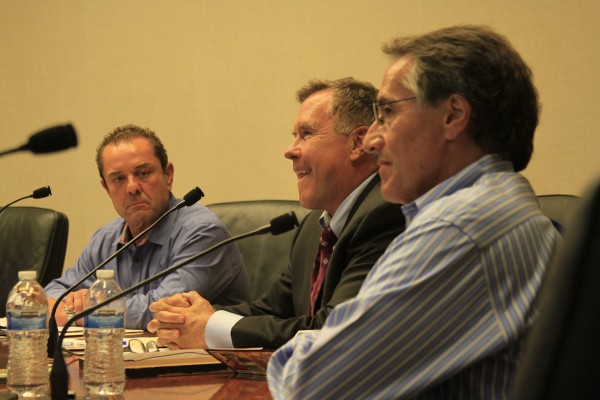By Jennifer Erickson | LB Indy
“Is this a three-ring circus I’m in, or what?” asked incumbent City Council candidate Kelly Boyd about midway through a boisterous debate hosted by Firebrand Media, owner of the Indy, Tuesday night at City Hall.
Firebrand owner Allan Simon fired provocative questions at the seven candidates vying for three City Council seats in the Nov. 4 election. Though he outlined a format for questions, answers and rebuttals in advance, Simon reserved the right to change things up as he saw fit.

The circus analogy rang true at times during the somewhat unorthodox debate as candidates alternately succumbed to provocation, rose above it, or did some of their own provoking. Whether because of or in spite of the tenuous decorum, the candidates spoke more frankly and passionately on the issues than at previous forums.
Whether or not the attendees who thronged the Council chambers found the adversity off-putting, they almost certainly left with a better understanding of how their aspiring representatives stood on topics ranging from the city manager’s duties and the budget process to the design review process and the Coastal Commission.

A multi-pronged query highlighted candidate views on the budget and taxation. Michele Hall said the budget was fine, and she could foresee no reason to raise taxes, but she suggested the planning, building and fire departments could run more efficiently.
Candidate Eli Grossman said the arts and the homeless should get a bigger piece of the pie, and added that he’s open to new taxes pending public discussion.
To help the public understand “what money comes in and what it’s spent on, what we control and what we don’t control” candidate Rob Zur Schmiede proposed greater transparency at the front end of the budget process.
Candidate Paul Merritt said that as the budget’s custodian, the city treasurer, a part time elected official, should “be given a full time watch over our money.”
Incumbent Toni Iseman agreed that the treasurer “hasn’t been treated fairly.” She also pointed out that “nobody shows up” to the public budget hearings, and noted that taxes are sometimes needed, such as a property tax levy imposed several years ago for a critical sewer system upgrade.
Boyd agreed that people don’t attend the budget hearings. “You almost have to drag ’em in here,” he said.
Simon’s query to Zur Schmiede about the lack of plans published during his tenure on the Planning Commission elicited passionate comments from all.
Merritt referred to the Design Review Board’s oversight of building projects as a “Byzantine process” and said the planning process in general is “a bureaucracy that needs repair and reform.”
Eight or 10 years ago, those words “would have been mine,” said Iseman. But the process has since been dramatically improved, and if the Design Review Board did not protect our homes and neighborhoods, “this town would be a mess,” she said.
“I don’t think the Design Review Board and the Planning Commission are working,” said Hall, questioning Iseman’s assessment.
Zur Schmiede objected to the inherent accusation “that nothing has happened during my 13 years on the Planning Commission,” adding, “nothing could be further from the truth.”
He listed the commission’s accomplishments during his tenure, including approving the downtown parking management plan, a new land use element and anti-mansionization ordinance; starting an evaluation of the downtown specific plan and land uses in the canyon; and revising the artists live/work ordinance. He added that one of his “proudest” achievements in a 36-year career was his work on establishing new residential guidelines. The citizen-led effort produced recommendations that now inform the Design Review Board, which he called “a civic treasure.”
Simon opened another can of worms by questioning candidates about the city’s management structure, where a five-person, part time council oversees a city manager.
“We do pick the city manager and we oversee the city manager,” said Boyd, but ultimately City Manager John Pietig runs the daily operations with the help of the staff. The city “runs pretty damn well,” Boyd said.
It’s the Council’s job to set the policy and the city manager’s job to act on it, said Zur Schmiede. But the Council is responsible for holding the city manager accountable, he said.
Grossman said he would prefer a model where the city manager has less power.
Iseman pointed out that sometimes the lines of authority get blurred. While it is the prerogative of an elected official to place issues on the agenda, Pietig sometimes discouraged her from bringing items forward, creating a sort of tug-of-war, “and that’s not his job,” she said. “We, as Council members, need to be strong to move forward,” she said.
Once you pick the city manager, you have to let him do his job, said Jon Madison.
Shifting the dialogue, Merritt suggested the Council wrest the city manager’s authority to hire the police chief and insist that a woman fill the post. Boyd said qualifications, not gender, should guide that decision. And Hall proposed that the police chief report to the Council instead of the city manager.
Asked about Laguna’s relationship with the California Coastal Commission, Boyd vehemently objected to its “telling us what we should or shouldn’t do in our community.” However, he offered no plan for mitigating their influence over local projects beyond suggesting that we “get rid of them.”
“I share Kelly’s disgust,” said Zur Schmiede, “but we need to deal with the reality.” Absent a statewide initiative to curb their powers, “we’re stuck with them.” In the meantime, working with the Coastal Commission staff is the “only tool really available to us,” he said.
“Rob is right. You have to have relationships with the staff,” agreed Iseman.




